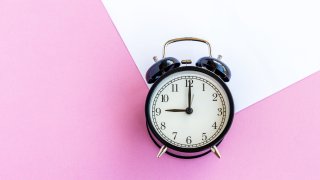
Imagine having the light evening hours of summer all year round. This could be our reality if Congress passes the Sunshine Protection Act, making daylight saving time (DST) the new normal for all states — with the exception of Hawaii and certain parts of Arizona, where standard time is always observed.
The bill was introduced by Sen. Marco Rubio, R-Fla., in 2021. Rubio believes the act can "reduce crime, encourage kids to play outside and lower the risk of heart attacks and car accidents," according to NBC News.
Daylight saving time is when time jumps forward by an hour. And though we "lose" an hour of sleep temporarily, we gain an hour of sunlight until the fall.
Recently, we made the switch to standard time (ST), meaning the time goes backwards by one hour. On Nov. 6, at 2 a.m. ET, time went back and we "gained" an hour of sleep, but lost an hour of sunlight.
While permanent daylight saving time might sound like the perfect solution, the bill was stalled recently by the House of Representatives — it was unanimously passed by the Senate in March.
The opinions of sleep experts like Shelby Harris, a licensed clinical psychologist and director of sleep health at Sleepopolis, just might have had something to do with the delay.
"That idea is terrible for our bodies," Harris says.
Money Report
Here's why Harris, and other sleep experts, believe that implementing the change to permanent daylight saving time won't positively affect people like they think it would.
Sleep experts vote 'no' on permanent DST
While Harris does agree that we should stop making the switch every year, she thinks standard time should be the permanent choice.
"The reality is that standard time is much more in alignment with what our bodies should be doing. Our body's natural circadian clock, for the majority of people, is set along with standard time," she says.
Standard time is "more aligned with light coming out in the morning to set your body's circadian rhythm," Harris says. "And even though it's dark at night and in the winter for a long time, it should be dark before we go to bed."
In sleep medicine, switching our clocks back and forth has always been something experts wanted to change, says Harris.
Going from ST to DST, and vice versa, has often led to major issues while people adjust to the change, she adds, especially when we spring forward.
When the clocks move ahead an hour in the spring, research shows it has led to:
- Increases of car accidents
- More workplace injuries
- Higher risk of heart attacks (a single study found)
3 ways permanent DST could impact your sleep
Here are some ways that permanent daylight saving time could affect sleep, according to Harris:
- Less access to light in the morning
- More difficulty waking up
- Increased hyperstimulation for teens due to more light closer to bedtime
"We really would prefer for our bodies, for safety and just in general, to stay in standard time for here on in," says Harris.
"There's a lot of consequences that can happen from daylight saving [time] if it was permanent, especially in the winter."
Want to earn more and work less? Register for the free CNBC Make It: Your Money virtual event on Dec. 13 at 12 p.m. ET to learn from money masters like Kevin O'Leary how you can increase your earning power.
Sign up now: Get smarter about your money and career with our weekly newsletter






